
All of New York City looks forward to the month of March when we celebrate Irish heritage. Woodlawn is a destination for those who are honoring the lore of St. Patrick and the notable figures who came from the Emerald Isle.
There are several commissioned monuments on Woodlawn’s 400 acre grounds filled with symbols and saying connected to Ireland. When you walk into the Parkview Plot, you’ll see a large granite basket surrounded by an archway that reads The Kerry Gow. Known as the Murphy Memorial, the monument celebrates the life of Irish actor Joseph Murphy (1842-1919) who performed his well known play to the miners and workers who were developing the west. Shamrocks, upturned horseshoes and statues of Saints Patrick and Bridget are carved into the stone.
Right next to the Murphy Memorial is the archway that commemorates the life of William Sullivan (1876-1947) the “Patron of Music,” Sullivan was an attorney who represented many artists, specifically stars of opera. He hosted a music festival in Connecticut and his support of the arts continues today through the William Sullivan Foundation which gives grants to support the work of opera singers. Among those who have received these prestigious funding awards is Metropolitan Opera star Rene Fleming.
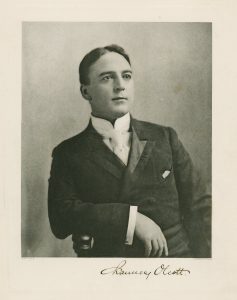
Chauncey Olcott (1858-1932) was inducted into the Songwriter’s Hall of Fame in 1970. The Buffalo born first generation Irish-American wrote When Irish Eyes are Smiling and My Wild Irish Rose. In addition to composing several tunes about Ireland, he was a beloved Broadway star. Olcott’s unique memorial is located on the Hickory Knoll Plot.
Another leader in New York entertainment was Victor Herbert (1859-1924) known for his work in “Light Opera” and as one of the founders of ASCAP, the American Society of Composers, Authors and Publishers. Herbert was born in Dublin, trained in Germany and at the age of twenty-seven he moved to New York City. He was a conductor, played the cello and Naughty Marietta is considered his most successful composition. Immediately after his passing, a death mask was made; it is in the collection of the United State Library of Congress.

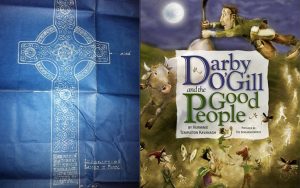
Tales of Ireland were recorded in the writings of Herminie Templeton Kavanagh (1861-1933), author of Darby O’Gill and the Good People. Her work provided the basis for the Disney film starring Sean Connery. She is at rest under a beautiful Celtic cross in the Rose Hill Plot.
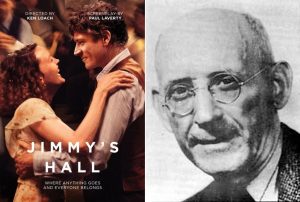
The Irish have a reputation for being passionate about politics. James “Jimmy” Gralton (1886-1945) is known as the only Irish citizen to be deported from his own country. A political activist associated with the Communist Party, Gralton ran a dance hall where political rallies were held. His story was depicted in the 2014 movie Jimmy’s Hall.
Another activist who fled his homeland was Francis Millen (1831-1889), a republican sympathizer involved in what became known as the “Jubilee Plot,” an attempt on the life of Queen Victoria. Millen was reported to be a member of the Clan na Gael and was also thought to be a British spy. He was allowed to flee the county and took up residency in New York.
There are several Irish immigrants memorialized at Woodlawn who 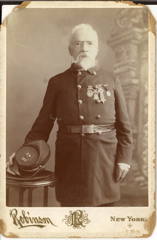 fought for the Union during the Civil War and served the people of New York. Thomas Joseph Kelly (1833-1908) was born in County Galway and as a young man apprenticed in the printing trade. He emigrated to America in 1851, worked as a printer and a decade after his arrival he enlisted in the Union Army. At the end of the war Kelly took up residency in New York where he became active in the Irish Republican Brotherhood. He played a role in the Fenian Rising of 1867, was involved in the “Manchester Martyrs” incident, and remained active in Irish politics until the end of his life. Kelly’s memorial was issued by the U.S Veterans Administration and is located along the fence line in Lot A.
fought for the Union during the Civil War and served the people of New York. Thomas Joseph Kelly (1833-1908) was born in County Galway and as a young man apprenticed in the printing trade. He emigrated to America in 1851, worked as a printer and a decade after his arrival he enlisted in the Union Army. At the end of the war Kelly took up residency in New York where he became active in the Irish Republican Brotherhood. He played a role in the Fenian Rising of 1867, was involved in the “Manchester Martyrs” incident, and remained active in Irish politics until the end of his life. Kelly’s memorial was issued by the U.S Veterans Administration and is located along the fence line in Lot A.
Dennis Burke (1841-1893), the last leader of the New York’s “Irish Brigade,” rests below a monument decorated with his Civil War cap, a sword and patch of shamrocks carved in a light pink stone. Originally buried with the members of the “Fighting 69th”, three years after his death Burke was moved to Woodlawn where he could have a unique memorial that accommodated the symbols of his career.
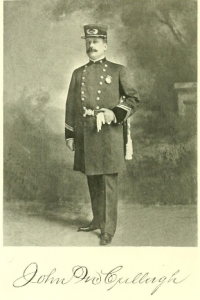
In 1897, John McCullagh (1845-1917) was appointed to the position of Superintendent of the New York City Police Department, making him the first “top cop” to supervise the protection of the five boroughs following consolidation. When McCullagh took office he said, “Let us start fairly and do the best for this city.” Following McCullagh’s death in 1917, the “John McCullagh Memorial Committee” was formed to raise funds to erect a suitable memorial. Sculptor Ernest W. Keyser was commissioned to create the bronze image of the lawman.
Geraldine Fitzgerald (1913 – 2005) was an Irish-American actress and a member of the American Theatre Hall of Fame. Born in Greystones, County Wicklow she received an Academy Award nomination for her supporting performance in Wuthering Heights. To younger movie-goers, she played Dudley Moore’s grandmother in Arthur in 1981
Service, song and strong beliefs are what the Irish who made New York home are known for. Make a pilgrimage to Woodlawn to read the epitaphs of patriots and entertainers and enjoy the remarkable Celtic crosses that pay tribute to those who share the tales of their homeland.
